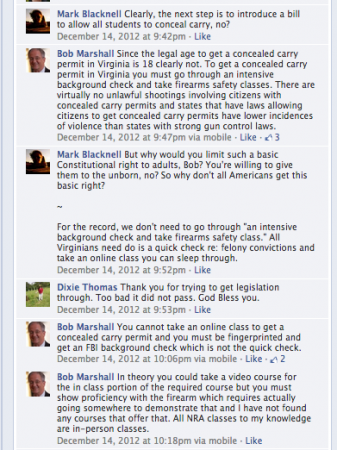So Virginia’s favorite emissary from the Dark Ages, Del. Bob Marshall, is back in Richmond and ready to push guns into our schools. So Del. Marshall knows the law when it comes to guns, right? Check this out, from last month:

For the record, you can take an online class and you do not need to be fingerprinted (in fact, Del. voted to repeal that requirement just last year). Further, you do not need to show any kind of proficiency with a firearm in order to get a concealed carry permit. Finally, the online class? Is a rather unfunny joke. The quality of Virginia’s legislation and legislators is on full display here.
Update:
To save readers the trouble of verifying the above, here are the requirements for residents, as set out by the Virginia State Police (emphasis supplied):
Application for a Concealed Handgun Permit
Any person 21 years of age or older may apply in writing to the clerk of the circuit court of the county or city in which he or she resides, or if he is a member of the United States armed forces, the county or city in which he is domiciled, for a five-year permit to carry a concealed handgun.
[ . . .]
The court shall require proof that the applicant has demonstrated competence with a handgun and the applicant may demonstrate such competence by one of the following, but no applicant shall be required to submit to any additional demonstration of competence:
- Completing any hunter education or hunter safety course approved by the Department of Game and Inland Fisheries or a similar agency of another state;
- Completing any National Rifle Association firearms safety or training course;
- Completing any firearms safety or training course or class available to the general public offered by a law-enforcement agency, junior college, college, or private or public institution or organization or firearms training school utilizing instructors certified by the National Rifle Association or the Department of Criminal Justice Services;
- Completing any law-enforcement firearms safety or training course or class offered for security guards, investigators, special deputies, or any division or subdivision of law enforcement or security enforcement;
- Presenting evidence of equivalent experience with a firearm through participation in organized shooting competition or current military service or proof of an honorable discharge from any branch of the armed services;
- Obtaining or previously having held a license to carry a firearm in this Commonwealth or a locality thereof, unless such license has been revoked for cause;
- Completing any firearms training or safety course or class, including an electronic, video, or on-line course, conducted by a state-certified or National Rifle Association-certified firearms instructor;
- Completing any governmental police agency firearms training course and qualifying to carry a firearm in the course of normal police duties; or
- Completing any other firearms training which the court deems adequate.
A photocopy of a certificate of completion of any of the courses or classes; an affidavit from the instructor, school, club, organization, or group that conducted or taught such course or class attesting to the completion of the course or class by the applicant; or a copy of any document which shows completion of the course or class or evidences participation in firearms competition shall constitute evidence of qualification under this subsection.
No applicant shall be required to submit to any additional demonstration of competence, nor shall any proof of demonstrated competence expire.
[ Â . . . ]
The court shall issue the permit within 45 days of receipt of the completed application unless it appears that the applicant is disqualified.
Want an example of the kind of online class we’re talking about? Â Check out VAGunTraining.com, where $25 and less than 25 minutes (the video itself is 17:28) will get you a certificate acceptable for a concealed carry permit. Â From their FAQ:
Can I really get a Virginia Concealed Handgun Permit by just taking this class?
Just like any other training recognized by the state, you will still need to apply at your local courthouse and pay the appropriate fees. You must also pass the required background check conducted by your local courthouse. Our training satisfies the competency requirement for obtaining a Concealed Handgun Permit in the state of Virginia.
Is your class state recognized?
Yes. Virginia residents are able to obtain a Concealed Handgun permit by using our state-recognized class to prove firearm competency. You will still need to apply at your local courthouse and pass a background check.
So I can get a Virginia Concealed Handgun Permit without firing a gun?
Yes. The law requires passing a safety class that meets certain requirements. Our class meets and exceeds these requirements so firing a handgun is not required.
Think this might be too much? Â No worries:
How hard is the test?
If you watch our video, the test will be incredibly easy for you to pass even if you have no prior firearm experience. We have a 99.9% first time pass rate.
If I fail the test, can I retake it for free?
Yes, you may retake the test as many times as you it takes for you to pass the exam free of charge. If you fail, we encourage you to rewatch the video.
This hasn’t always been the case, in Virginia. Â Not too long ago, you did actually need to demonstrate competence at a range, and get fingerprinted (in Arlington, at least). Â Now? Â Well.
Don’t you feel safer knowing that anyone with $25 and no serious record can carry around a deadly weapon in his pocket?

